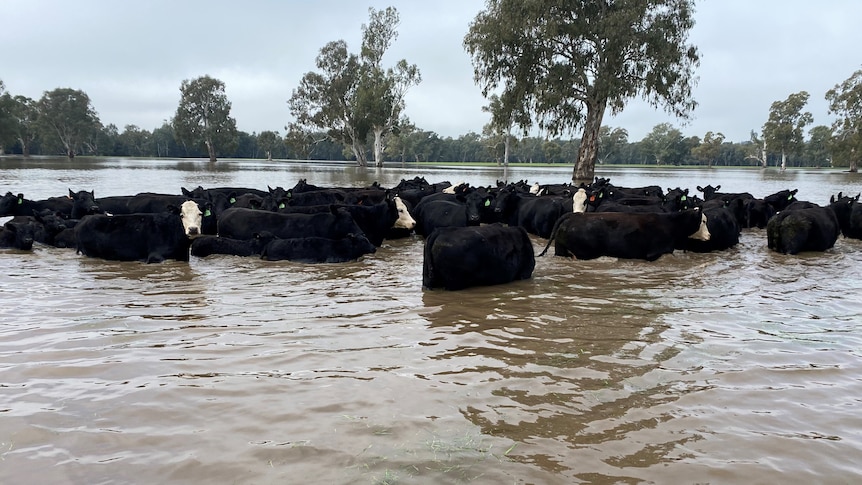Farmers who lost livestock due to flooding along the Murrumbidgee River say water management by dam operators has made the event worse than it needed to be.
Key points:
- Murrumbidgee River landholders say they expect some flooding, but dam management has exacerbated recent flood events
- A Borambola farmer, east of Wagga Wagga, lost dozens of calves and has cattle stranded by floodwater
- Wagga Wagga MP Joe McGirr says dams should not be kept at such high levels, given the risk posed to downstream landholders and communities
The Murrumbidgee River reached moderate to major flood levels this week following releases of close to 100,000 megalitres a day from Burrinjuck Dam after record inflows from some parts of the catchment.
Borambola farmer Trish Cookson lost dozens of calves in the flood, with some washing up dead, and still has cattle stranded by floodwaters.
She said they could have managed the anticipated flows of up to six meters but they struggled with the larger than expected water release.
“We’ve made several attempts with boats, dogs, neighbours, trying to get the cattle out… it’s very heartbreaking,” Ms Cookson said.
She said living on the banks of the Murrumbidgee, they expected some natural riverine flooding, but keeping dams at such high levels during a La Nina year was “reckless.”
“I would say that it’s been mismanagement of the water storage facilities,” she said.
Ms Cookson said there were plenty of opportunities throughout the year for dam managers to lower dam levels.
Of the two Murrumbidgee storages, Burrinjuck Dam has not fallen below around 80 per cent this year, while Blowering Dam has not dropped far below 90 per cent full.
WaterNSW is in charge of dam operations and said Burrinjuck Dam filled and spilled due to inflows that were higher than forecast.
“The Yass River at Yass, in particular, experienced its highest flood peak since records began in 1915,” WaterNSW said in a statement.
“WaterNSW will make releases from rural dams well in advance of an event in order to create airspace and mitigate the impacts of future rain events.
“However, when storages are full WaterNSW has limited ability to mitigate floods.”
Flooding impacts ‘seem to be ignored’
Independent Wagga Wagga MP Joe McGirr said he had been contacted by several landholders concerned about the dam management.
“The concern that landholders have expressed to me is when those levels are kept too high. The risk is when you get a sudden weather event… the dam spills,” Dr McGirr said.
Dr McGirr said he had brought the issue to the attention of NSW Parliament this week.
“It’s almost as though so much priority is given to the need for the irrigators to have their water and the environmental flows that the effects of flooding… seem to be ignored.”
Fear of more flooding this spring
Ms Cookson said she was holding out hope that floodwaters would recede soon, but with a full catchment and wet spring predicted, any relief could be short-lived.
“I can only see that for every rain event that happens, we’re going to be plunged further and further into this quagmire that we’re in at the moment,” she said.
“I fear for those animals. We will continue to try and find a way to get them out.”
Murrumbidgee River landholders are also worried about the NSW government’s program to more effectively deliver environmental water to the Murray Darling Basin.
The Reconnecting River Country Program could see the river run at higher flow rates, potentially exacerbating natural flooding events.
“After having the water modeling done on our property, we know that the reconnecting river program is virtually going to make our property not a viable business,” Ms Cookson said.
“We have a billabong that cuts from one of our property to the other.
“At the higher flow levels that they’re predicting, we will not be able to access 34 per cent of our property.”
The Department of Planning and Environment said current water levels seen across the Riverina were well above the flows being considered by the program.
“We take the views of landholders and stakeholders seriously, and we encourage them to have their say on the flood mapping and flow options to ensure we get it right,” a Department of Planning and Environment spokesperson said.
.
